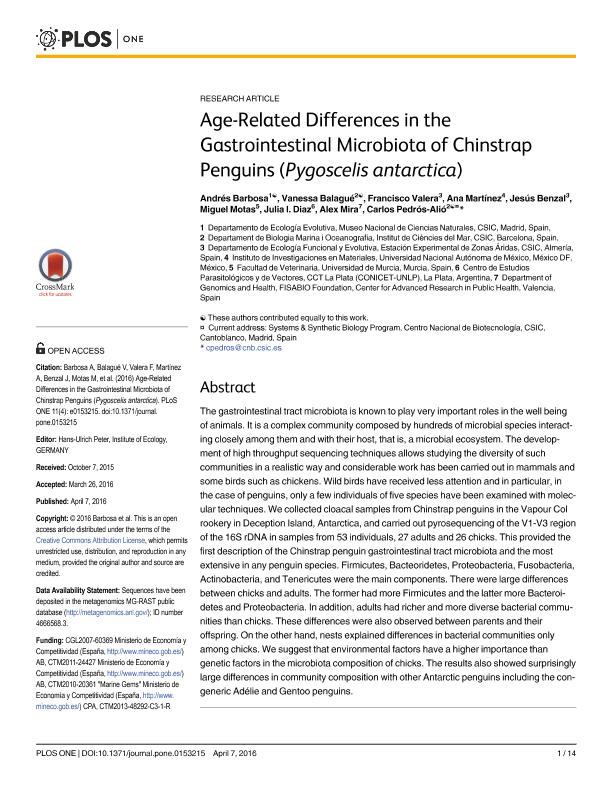Mostrar el registro sencillo del ítem
dc.contributor.author
Barbosa, Andrés
dc.contributor.author
Balagué, Vanessa
dc.contributor.author
Valera, Francisco
dc.contributor.author
Martínez, Ana
dc.contributor.author
Benzal, Jesús
dc.contributor.author
Motas, Miguel
dc.contributor.author
Diaz, Julia Inés

dc.contributor.author
Mira, Alex
dc.contributor.author
Pedrós Alió, Carlos
dc.date.available
2018-06-18T16:11:48Z
dc.date.issued
2016-04
dc.identifier.citation
Barbosa, Andrés; Balagué, Vanessa; Valera, Francisco; Martínez, Ana; Benzal, Jesús; et al.; Age-related differences in the gastrointestinal microbiota of chinstrap penguins (pygoscelis antarctica); Public Library of Science; Plos One; 11; 4; 4-2016; 1-17; e0153215
dc.identifier.uri
http://hdl.handle.net/11336/48998
dc.description.abstract
The gastrointestinal tract microbiota is known to play very important roles in the well being of animals. It is a complex community composed by hundreds of microbial species interacting closely among them and with their host, that is, a microbial ecosystem. The development of high throughput sequencing techniques allows studying the diversity of such communities in a realistic way and considerable work has been carried out in mammals and some birds such as chickens. Wild birds have received less attention and in particular, in the case of penguins, only a few individuals of five species have been examined with molecular techniques. We collected cloacal samples from Chinstrap penguins in the Vapour Col rookery in Deception Island, Antarctica, and carried out pyrosequencing of the V1-V3 region of the 16S rDNA in samples from 53 individuals, 27 adults and 26 chicks. This provided the first description of the Chinstrap penguin gastrointestinal tract microbiota and the most extensive in any penguin species. Firmicutes, Bacteoridetes, Proteobacteria, Fusobacteria, Actinobacteria, and Tenericutes were the main components. There were large differences between chicks and adults. The former had more Firmicutes and the latter more Bacteroidetes and Proteobacteria. In addition, adults had richer and more diverse bacterial communities than chicks. These differences were also observed between parents and their offspring. On the other hand, nests explained differences in bacterial communities only among chicks. We suggest that environmental factors have a higher importance than genetic factors in the microbiota composition of chicks. The results also showed surprisingly large differences in community composition with other Antarctic penguins including the congeneric Adélie and Gentoo penguins.
dc.format
application/pdf
dc.language.iso
eng
dc.publisher
Public Library of Science

dc.rights
info:eu-repo/semantics/openAccess
dc.rights.uri
https://creativecommons.org/licenses/by-nc-sa/2.5/ar/
dc.subject
Microbiota
dc.subject
Penguin
dc.subject
Gastrointestinal Tract
dc.subject
Pyrsequencing
dc.subject
Diversity
dc.subject
Antarctica
dc.subject.classification
Otras Ciencias Biológicas

dc.subject.classification
Ciencias Biológicas

dc.subject.classification
CIENCIAS NATURALES Y EXACTAS

dc.title
Age-related differences in the gastrointestinal microbiota of chinstrap penguins (pygoscelis antarctica)
dc.type
info:eu-repo/semantics/article
dc.type
info:ar-repo/semantics/artículo
dc.type
info:eu-repo/semantics/publishedVersion
dc.date.updated
2018-06-18T13:31:38Z
dc.identifier.eissn
1932-6203
dc.journal.volume
11
dc.journal.number
4
dc.journal.pagination
1-17; e0153215
dc.journal.pais
Estados Unidos

dc.journal.ciudad
San Francisco
dc.description.fil
Fil: Barbosa, Andrés. Consejo Superior de Investigaciones Cientificas. Museo Nacional de Ciencias Naturales; España
dc.description.fil
Fil: Balagué, Vanessa. Consejo Superior de Investigaciones Científicas. Instituto de Ciencias del Mar; España
dc.description.fil
Fil: Valera, Francisco. Consejo Superior de Investigaciones Científicas. Estación Experimental de Zonas Aridas; España
dc.description.fil
Fil: Martínez, Ana. Universidad Nacional Autónoma de México; México
dc.description.fil
Fil: Benzal, Jesús. Consejo Superior de Investigaciones Científicas. Estación Experimental de Zonas Aridas; España
dc.description.fil
Fil: Motas, Miguel. Universidad de Murcia; España
dc.description.fil
Fil: Diaz, Julia Inés. Consejo Nacional de Investigaciones Científicas y Técnicas. Centro Científico Tecnológico Conicet - La Plata. Centro de Estudios Parasitológicos y de Vectores. Universidad Nacional de La Plata. Facultad de Ciencias Naturales y Museo. Centro de Estudios Parasitológicos y de Vectores; Argentina
dc.description.fil
Fil: Mira, Alex. Fundación para el Fomento de la Investigación Sanitaria y Biomédica de la Comunitat Valenciana; España
dc.description.fil
Fil: Pedrós Alió, Carlos. Consejo Superior de Investigaciones Científicas. Instituto de Ciencias del Mar; España
dc.journal.title
Plos One

dc.relation.alternativeid
info:eu-repo/semantics/altIdentifier/doi/http://dx.doi.org/10.1371/journal.pone.0153215
dc.relation.alternativeid
info:eu-repo/semantics/altIdentifier/url/http://journals.plos.org/plosone/article?id=10.1371/journal.pone.0153215
Archivos asociados
